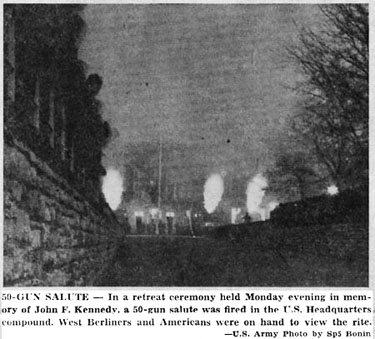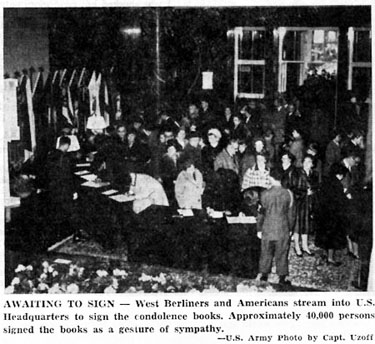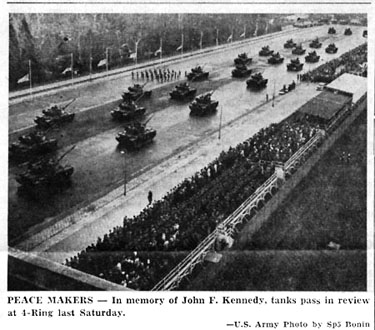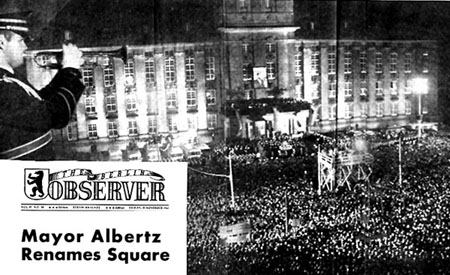JFK Death stuns Outpost residents
|
|
One week after the death of John F. Kennedy, the city which gave him the warmest welcome in its history continues to mourn his passing. Many Americans here in the Divided City feel that the grief of the people of West Berlin may very well be unequalled anywhere outside the United States For three days following the shooting of the American President forty thousand Berliners made their way to U.S. Headquarters on Clayallee to sign a condolence book. It represented their effort "to show the people of American how sorry we are to hear of his death" said one woman waiting to sign her name. The crowd became so great that instead of closing Its doors as scheduled the American Headquarters remained open day and night to accommodate mourners. "These people really cared a lot for the man" said a Berlin Brigade Honor Guard member who volunteered to remain on duty for 15 hours a day to assist elderly people in placing flowers at the base of a large picture of the deceased President set up in the main hall of the building. "After they sign the book they often won't move", said Private First Class Alfred Galdony, "They just stare at the picture and sometimes mutter to themselves. It's as if he were one of their kin." Another focal point of the Berliners demonstration of common grief was Schoeneberg Rathaus, West Berlin's City 'Hall. At midnight on November 22, four hours after news of the President's death reached Berlin, 50,000 grieving people stood silently in front of the city hall to hear Governing Mayor Willy Brandt tell them with tears streaming down his face 'America has lost a president; Berlin has lost a friend".
|

|
The following evening 20,000 Berlin youths bearing lighted candles and torches walked in dead silence from the Airlift Memorial near Tempelhof Airport to the square in front of city hall. Even the military bus bringing GI servicemen from Tempelhof had difficulty getting through the crowd. The marchers followed the same route that Kennedy took on his visit in the city five months previous, almost to the day. In windows from where they had cheered the American President last June the Berliners placed lighted candles symbolizing their loss. There was hardly a habitable building from which a tiny flame did not flicker in some windows. The candles were requested lit by Mayor Brandt.
|

|
The next evening, the day of the President's funeral, 260,000 Berliners gathered in the same square in front of city hall where Kennedy told them "I am a Berliner". Packed in an astonishing silence beneath a large picture of the President taken six months ago as he stood on that same spot, the Berliners heard their square renamed "John F. Kennedy Platz". An American soldier who was present said that after the playing of taps at the end of the dedication he could not find a dry eye among the surrounding Berliners. To the Berliner, Kennedy was not only a politician; he was even more than a symbol of their freedom. The man whom Americans called president, the Berliners regarded as a friend.
|


|

